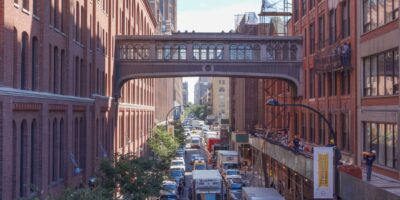My Grandfather’s Disability Led to a Great Career
I was perhaps 10 years old and my maternal grandfather invited me to a special dinner. He was being honored by a large crowd.
I was confused most of the evening. I sat at the end of a table with vast numbers of guests, but they all had the notable distinction of being Korean, Japanese, and Chinese immigrants. They were bowing to each other and to him and to me. They were speaking in broken English about his glories as a man.
I was just a bit uncomfortable because it was a culture shock. But he was in his natural habitat, smiling and at ease all night.
How did this West Texas man, the fourth generation of Scottish immigrants, become a hero to the Asian communities in El Paso, Texas? It took a lifetime for me to discover the circuitous route by which this came to be.
He was in the grocery business – a wholesaler. Large companies would contact him to market their products to stores. His house was filled with free samples: soaps, sauces, juices, noodles, or whatever. As kids, we liked to try these products. He always convinced us that the product was the greatest thing that ever happened, to the point that we would drink steak sauce like it was a yummy cocktail or wash our hands incessantly because the soap smelled the way a soap should.
He was a wonderful salesman with a funny, casual, but persistent way about him.
He also had a disability. I knew about it only because I saw various bottles of lanolin all over the house. It was a thick oil he would rub on his hands. His hands were flakey, scaly, cracked, and even bloody from a severe form of eczema. Medicines for this condition weren’t available then as they are now. So he lived with it.
In business, you have to shake hands. I feel sure that he was mortified to do so. This must have become a huge problem in his line of work. Or maybe it wasn’t a real problem but he felt like it was. The issue consumed him. Probably he believed that every failed business deal was actually due to his rough and scaly hands.
Whether this was true or not doesn’t matter. My mother reports that he regarded his affliction as debilitating. He always had this lanolin smeared on them, but the problem never went away.
Then he one day discovered a whole community that greeted each other not with a handshake but a bow. I wish I could crawl into his brain on the day that he realized this. It was sometime in the 1960s, as best I can tell.
Then he discovered something else: this community was growing, had huge numbers of restaurants and small stores, and was being neglected by everyone else in the industry. He immediately decided to specialize, in light of his own disability, to serve this underserved community.
It was a beautiful match. He loved them and they loved him. He became something of a Texas wholesale-grocery mogul. As this sector of the market grew, manufacturers came to him because he seemed to have special access to a market that was otherwise hard to reach. The Asian community trusted him. He served them. And he became rich.
All because of a problem that vexed him for his entire life. And a market that was in need of someone to pay attention.
As a child, I couldn’t figure it out. Why is my grandfather a hero to this vast community of Asian immigrants? Decades later, the secret was revealed to me. He had a problem. They had a problem. The market brought them together.











